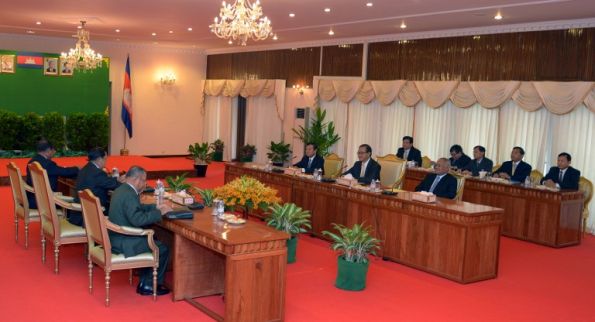
AN INTENSE political deadlock, played out against a backdrop of protests and deadly state violence, has come to an end. For nearly a year Cambodia’s national assembly was without an opposition; struggle in the streets had replaced normal politics and was starting to look like a permanent feature of the capital, Phnom Penh.
Then on July 22nd, the main opposition group, Sam Rainsy’s Cambodia National Rescue Party (CNRP), struck a deal with the prime minister’s Cambodian People’s Party (CPP): they would end their boycott of the parliament in exchange for an important bit of electoral reform.
At one point the CNRP had demanded nothing less than fresh elections to toss out the current parliament, but in the end their leadership has settled for smaller things. In addition to the electoral reform, seven of the CNRP’s winning candidates and an affiliated activist have been released from jail. All of them had been arrested after a violent clash with government security guards at a central protest site on July 15th.
The deadlock lasted almost exactly a year. Elections were last held on July 28th of 2013. When the CPP claimed victory the CNRP charged them with rigging the vote. The opposition, along with plenty of foreign observers, tend to regard the CPP as a corrupt and land-grabbing gang. When the electoral commission awarded them a parliamentary majority, the CNRP boycotted the 55 seats it was acknowledged to have won (against the 68 that were called for the CPP). The ruling party wasted no time in running its own legislation through parliament without pause for discussion—let alone debate.
The timing of the deal, so near the anniversary of the contested election, might not be a coincidence. Both sides were feeling the public pressure to reach an agreement. For the opposition, the question was how long they could keep operating as a political force with only rallies and public protests to bind them together, while laws were passed without them in the assembly. The government was faced with the prospect of having to keep defending that one-party parliament to the international community.
The violence the government employed to disperse protesters drew a steady stream of criticism throughout the year. Security forces beat and arrested demonstrators, and at least seven were shot dead.
For the first time in a year, dissenting voices will be heard again in parliament. Mr Rainsy says of his deal that “there is no better choice—it is the best choice.” He is confident it will stick. “We have obtained what we most wanted, which is a reform of the electoral system, especially the electoral commission, which has been until now, dominated by the ruling party…The composition will be more balanced [and] have the same representation [from each side].”
The electoral commission is at the heart of the deal. The CPP-dominated National Election Committee—widely derided as a puppet of the government—is to be overhauled, which requires that the constitution be changed. The two major parties will now have four members on the committee, with a ninth independent member to be agreed on by both sides. This overhaul, Mr Rainsy says, will ensure future elections better reflect the will of the people.
There is more substance for the opposition to relish, beyond making future ballots fairer. Changes to the national assembly mean it will immediately cease being a “rubber-stamp parliament”, Mr Rainsy believes. “The opposition will have a say and leverage,” he said. The position of first deputy president of the assembly will automatically go to the CNRP, as will the leadership of five of its ten commissions.
So there is much for Mr Rainsy’s party to celebrate. As yet however there is no word on whether the next election, scheduled for 2018, will be brought forward. There have already been some negative reactions to the deal from supporters of the CNRP. While Mr Rainsy is at pains to announce his own satisfaction with it, there are others who insist that real reform is still a way off.
“What was missing from the negotiations was the detail,” said Ou Virak, the chairman of the Cambodian Center for Human Rights. He believes the deal was politically convenient for the country’s two largest parties. “There is no detail on how these things [the reforms] will be done.”
The new electoral commission, Mr Virak adds, is only one small step towards free and fair elections. In his reckoning, the simple fact of its rejigging should not be considered electoral reform. He has a similar view of the changes to the assembly. Changing the composition of its commissions is “physical, easy to see”, but Mr Virak thinks it will do little to stop laws being rubber-stamped.
Then there’s the inevitable pushback from the government of Hun Sen, the prime minister for almost 30 years now. He is known for wily political manoeuvring, as everyone knows; he is often referred to sardonically as being the prime minister for life. As Mr Virak points out, the opposition seems likely to face further challenges in having its new promises redeemed. “That’s politics; there will be resistance.”
Koul Panha, executive director of an election-monitoring NGO called Comfrel, is only a shade more optimistic. “It’s not yet change. The high risk in Cambodia is the implementation,” he said.
With a return to conventional politics, the opposition’s protest movement is set to decline. So too, perhaps, are the chances of a thorough investigation into the fatal shootings of the seven protesters. The CNRP says it will keep pushing for one, and that its new commissions should help.
Mr Virak takes a darker view. “No one will care about the justice for the victims; it’s no longer politically convenient. I don’t think there will be investigations.”
(Picture credit: AFP)

No comments:
Post a Comment